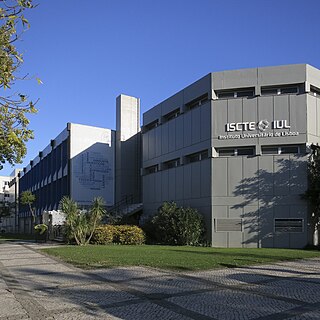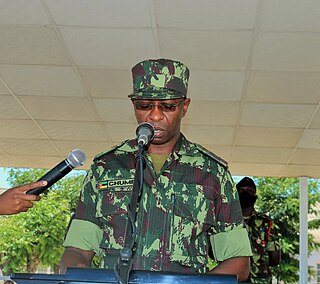
The Brazilian Armed Forces are the unified military forces of the Federative Republic of Brazil. Consisting of three service branches, it comprises the Brazilian Army, the Brazilian Navy and the Brazilian Air Force.

Taís Bianca Gama de Araújo Ramos is a Brazilian actress, TV host and model. Described by the media and general public as one of the great Brazilian actresses for her versatility in playing comedic and dramatic characters, in addition to being a very famous celebrity in Brazil.

France Winddance Twine is a Black and Native American sociologist, ethnographer, visual artist, and documentary filmmaker. Twine has conducted field research in Brazil, the UK, and the United States on race, racism, and anti-racism. She has published 11 books and more than 100 articles, review essays, and books on these topics.
Paulo Pereira de Almeida, Ph.D. (ISCTE) is a Portuguese academic. He is a professor at ISCTE in the areas of Organization and Management of Business, Labor and Internationalization Business.

Military sociology is a subfield within sociology. It corresponds closely to C. Wright Mills's summons to connect the individual world to broader social structures. Military sociology aims toward the systematic study of the military as a social group rather than as a military organization. This highly specialized sub-discipline examines issues related to service personnel as a distinct group with coerced collective action based on shared interests linked to survival in vocation and combat, with purposes and values that are more defined and narrow than within civil society. Military sociology also concerns civil-military relations and interactions between other groups or governmental agencies.

ISCTE – IUL is a Portuguese public tertiary education institution. It is located in the city centre of Lisbon, in Cidade Universitária, adjoining the Institute of Social Sciences (ICS) and Institute of Geography and Spatial Planning (IGOT) of the University of Lisbon. ISCTE was founded in 1972, starting with three degrees and 296 students. Formerly called Instituto Superior de Ciências do Trabalho e da Empresa, its full name was dropped in 2009 when it became a university institute of foundational nature.

Christiane Maria dos Santos Torloni is a Brazilian actress. She is the winner of numerous awards, including an APCA Award, two Prêmios Qualidade Brasil, and a Shell Award, as well as receiving nominations for a Grande Otelo and three Troféu Imprensas. She is one of the most renowned actresses in Brazilian television drama.

Women in Portugal received full legal equality with Portuguese men as mandated by Portugal's constitution of 1976, which in turn resulted from the Revolution of 1974. Women were allowed to vote for the first time in Portugal in 1931 under Salazar's Estado Novo, but not on equal terms with men. The right for women to vote was later broadened twice under the Estado Novo. The first time was in 1946 and the second time in 1968 under Marcelo Caetano, law 2137 proclaimed the equality of men and women for electoral purposes. By the early part of the 1990s, many women of Portugal became professionals, including being medical doctors and lawyers, a leap from many being merely office employees and factory workers.
Pedro Filipe Tinoco Monteiro is a Portuguese professional footballer who plays as a centre-back for Liga 1 club Madura United.
Carlos dos Santos Rodrigues, known as Carlos Ponck or simply Ponck, is a Cape Verdean professional footballer who plays as a centre-back for Primeira Liga club Moreirense.
Joel António Soares Ferreira is a Portuguese professional footballer who plays as a left-back for Liga 3 club Trofense.
Luís Carlos Rocha Rodrigues, known as Rocha, is a Portuguese professional footballer who plays for C.D. Santa Clara as a central defender.

The Ministry of National Defence and Homeland Veterans is an executive agency of the Government of Angola that controls the Angolan Armed Forces. It is based at Rua 17 de Setembro in Luanda.
Filipe Carreira da Silva is a Zimbabwean-born Portuguese social theorist at the Institute of Social Sciences of the University of Lisbon and at Selwyn College, Cambridge. He specializes in American philosophical pragmatism, critical theory and intellectual history of the twentieth century. He is the author or co-author of ten books, and the editor or co-editor of seven others, and he has also published more than thirty articles. He has a monthly column in the Portuguese daily newspaper Público.

Mariana Guimarães Vieira da Silva is a Portuguese sociologist and politician who served as Minister of the Presidency in António Costa's XXIII Constitutional Government, effectively in second in the government.

Vitória Pais Freire de Andrade was an active Portuguese feminist who played an important role in the Conselho Nacional das Mulheres Portuguesas in the 1920s. She is also known for her campaigning against bullfighting in Portugal.
The Organization of Mozambican Women is the women's section of FRELIMO. Founded in 1973, during the Mozambican War of Independence, in recognition of women's growing roles in the conflict against Portuguese colonialism, the OMM was created as a non-military structure to promote women's education, emancipation and mobilization. Following independence in 1975, the OMM focussed on issues related to women's education, ethnic division, divorce, family planning, adultery and promiscuity, prostitution, and alcoholism. In 1990, the OMM voted to separate from FRELIMO, although shortly thereafter, the organization re-affiliated.

Isabel Gago was only the second woman to study engineering in Portugal and the first woman to teach chemical engineering.

Cristóvão Artur Chume is a Mozambican military general who has been the Minister of National Defense since his appointment in November 2021. He had previously served as the Commander of the Army Branch of the Mozambique Defence Armed Forces from March to November 2021.

The Diploma Bertha Lutz, also known as the Prêmio Bertha Lutz, was established by the Federal Senate of Brazil to recognize women who have made contributions to the defense of women's rights and gender issues in Brazil. It is named in honor of the Brazilian biologist and feminist leader Bertha Lutz.













